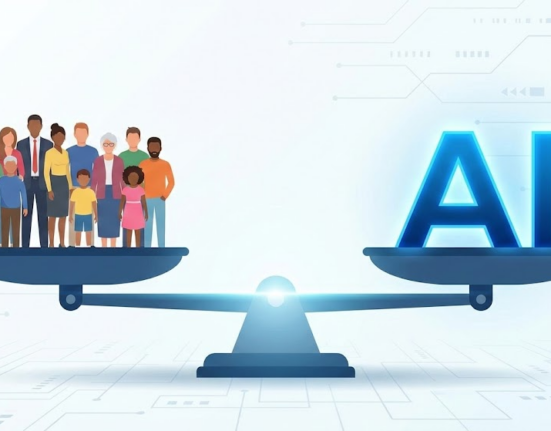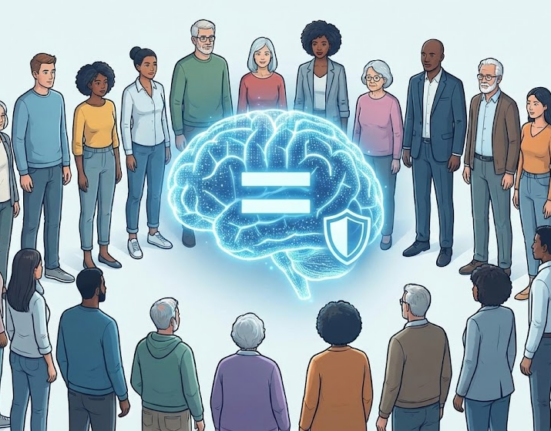Artificial intelligence is transforming the healthcare industry—from diagnosing diseases and managing patient data to developing life-saving drugs. Yet, as AI grows more powerful, it brings a crucial question to the forefront: How do we balance innovation with responsibility?
The rise of ethical AI in healthcare is not just about compliance—it’s about building trust, protecting patients, and ensuring technology truly serves humanity.
Let’s explore how healthcare organizations can harness AI’s potential responsibly while safeguarding ethics, transparency, and fairness.
Understanding Ethical AI in Healthcare
Ethical AI refers to the responsible development and deployment of artificial intelligence systems that prioritize fairness, accountability, transparency, and patient well-being.
In healthcare, ethical AI ensures that technology supports human decision-making rather than replacing compassion, privacy, or patient safety.
Core ethical principles include:
- Beneficence: Using AI to benefit patients and improve outcomes.
- Nonmaleficence: Ensuring AI systems do not cause harm.
- Justice: Providing equal treatment without algorithmic bias.
- Autonomy: Respecting patients’ rights to consent and control over data.
The Promise of AI in Healthcare
AI is already reshaping healthcare through:
- Faster Diagnoses: AI algorithms detect diseases in imaging and lab results earlier than humans.
- Predictive Analytics: Machine learning models forecast disease risk and treatment outcomes.
- Personalized Medicine: AI tailors therapies based on genetics and lifestyle.
- Operational Efficiency: Automation reduces paperwork and administrative tasks.
These advancements save lives—but they must be guided by ethical standards to ensure safety and trust.
Why Ethics Matter in Healthcare AI
Unlike other industries, healthcare deals directly with human lives. When AI systems make recommendations—or even assist in surgeries—the stakes are far higher.
Unethical or unregulated AI use can lead to:
- Misdiagnoses due to biased training data.
- Breaches of confidential medical records.
- Lack of accountability in automated decisions.
Without strong ethical frameworks, innovation risks becoming dangerous rather than transformative.
1. Data Privacy and Patient Consent
AI thrives on data, but healthcare data is among the most sensitive in the world.
Ethical challenges include:
- Ensuring patient consent before using data for AI training.
- Protecting personal health information (PHI) under regulations like HIPAA and GDPR.
- Anonymizing and encrypting datasets to prevent identity exposure.
Building transparency around how data is used fosters patient trust and regulatory compliance.
2. Bias and Fairness in AI Algorithms
AI models are only as fair as the data they’re trained on. If datasets overrepresent certain populations, predictions can become biased.
Example: A diagnostic AI trained mostly on data from younger adults may misdiagnose conditions in seniors or minorities.
To promote fairness:
- Include diverse, representative datasets.
- Continuously test for bias in algorithmic decisions.
- Involve cross-disciplinary review teams for auditing.
Ethical AI in healthcare must treat every patient equitably, regardless of background or demographics.
3. Accountability and Transparency
Who is responsible when AI makes a mistake—a doctor, a hospital, or the algorithm’s developer?
Ethical AI requires clear accountability frameworks defining who oversees AI decisions and outcomes. Transparency ensures that medical professionals understand how AI arrives at conclusions.
This concept is known as Explainable AI (XAI)—technology that provides insights into its reasoning process, making it easier for clinicians to trust and verify recommendations.
4. Balancing Human and Machine Decision-Making
AI should augment, not replace, healthcare professionals.
Doctors bring empathy, ethical judgment, and context—qualities machines cannot replicate. AI enhances these decisions by providing data-driven insights and reducing cognitive load.
The balance lies in human oversight, ensuring that algorithms serve as advisors, not decision-makers.
Alt text: ethical AI in healthcare supporting doctors with data-driven decisions
5. Security and Data Protection
Healthcare data breaches can have devastating consequences. AI systems must be fortified with advanced cybersecurity measures.
Best practices include:
- Multi-layer encryption and secure access controls.
- Continuous system audits and threat monitoring.
- Strict compliance with healthcare cybersecurity frameworks.
Protecting patient data is a cornerstone of ethical AI implementation.
6. The Role of Explainable AI (XAI)
Traditional AI models, like deep neural networks, often operate as “black boxes.” Explainable AI makes their decisions interpretable to humans.
In healthcare, XAI is essential because clinicians must understand why an AI system recommends a diagnosis or treatment.
Benefits of XAI include:
- Increased transparency and trust.
- Easier auditing and validation.
- Improved collaboration between doctors and machines.
7. Ethical AI in Medical Imaging
AI excels in analyzing medical images, from X-rays to MRIs. But ethical implementation is critical.
Systems must:
- Be validated across multiple populations.
- Include human verification in diagnosis.
- Avoid overreliance on automation in life-or-death cases.
Combining AI precision with human oversight ensures safe, reliable imaging diagnostics.
8. Regulation and Compliance
Governments and regulatory bodies are establishing guidelines for responsible AI use in healthcare.
Key frameworks include:
- FDA’s AI/ML-based Software as a Medical Device (SaMD).
- EU’s AI Act emphasizing safety and transparency.
- WHO’s Ethics and Governance of Artificial Intelligence for Health framework.
Compliance ensures that innovation progresses within ethical and legal boundaries.
9. Collaboration Between Technologists and Clinicians
Building ethical AI requires collaboration among:
- Developers (who build algorithms)
- Clinicians (who use them)
- Ethicists and policymakers (who regulate them)
Cross-functional teamwork ensures systems are safe, usable, and fair.
10. Continuous Monitoring and Auditing
Ethics doesn’t end at deployment. AI models evolve—and so must oversight.
Healthcare institutions should establish review boards to monitor performance, bias, and accuracy over time.
Regular audits detect unintended consequences early, maintaining trust and reliability.
Alt text: healthcare ethics committee reviewing AI algorithms and compliance
11. Educating the Healthcare Workforce
Healthcare professionals must be trained not just to use AI tools but to understand their ethical implications.
Ethical literacy empowers staff to question, validate, and guide AI outputs responsibly.
Training should include:
- Basics of machine learning and data ethics.
- Understanding algorithmic bias and explainability.
- Patient privacy and consent management.
Knowledge builds accountability.
12. The Future of Ethical AI in Healthcare
The future of healthcare lies in collaborative intelligence—where AI amplifies human expertise without compromising ethics.
Emerging trends include:
- AI models designed with built-in ethical constraints.
- Federated learning that trains algorithms without sharing sensitive data.
- Global ethical standards uniting technology and humanity.
When guided responsibly, AI has the power to democratize healthcare access, reduce errors, and improve outcomes worldwide.
Conclusion: Trust Is the Heart of Ethical AI
Ethical AI in healthcare isn’t about limiting innovation—it’s about guiding it responsibly.
True progress happens when technology respects privacy, fairness, and human dignity. By embedding ethics into every phase—from data collection to deployment—AI becomes not just a tool, but a trusted partner in healing.
Balancing innovation with responsibility ensures that as AI evolves, it remains human at its core.
FAQ
1. What is ethical AI in healthcare?
It’s the responsible use of AI technologies that prioritize fairness, accountability, transparency, and patient welfare.
2. Why is AI ethics important in medicine?
Because healthcare deals with human lives—ethical frameworks ensure technology benefits patients safely and fairly.
3. How can AI reduce bias in healthcare?
By using diverse training data, ongoing audits, and transparent algorithms to avoid unfair outcomes.
4. What are examples of ethical AI use in healthcare?
AI-assisted diagnostics, predictive analytics, and automated monitoring systems with human oversight.
5. What’s the future of ethical AI in medicine?
A future where AI supports clinicians, protects patient privacy, and promotes global health equity through responsible innovation.








